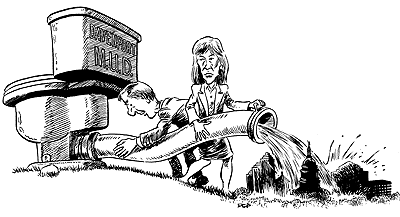Getting Dumped On?
Todd, Goodman Lead Charge for Davenport MUD
By Alex de Marban, Fri., March 21, 1997

|
But the MUD board, and the surrounding entities, say that doing their own sewage treatment is becoming less and less feasible. There are increasingly stricter regulations mandated by the Texas Natural Resources and Conservation Commission, and as the wastewater facilities have aged, the potential for liability in the event of pollution has increased. Thus, more than a year ago, the MUD board requested sewage service from the city.
Since the MUD said it would pay the $5 million needed for the pipeline and pumping facilities, staff went ga-ga, the Water and Wastewater Department screaming joyously that the deal would bring in between $250,000 to $500,000 annually for the next 25 years -- sans expense. City staff happily drew up a contract last December, but language concerning the agreed future annexation plans caused the Davenport MUD to recoil from the deal in horror. You see, the city had the gall to include a so-called "terminator clause" in the proposed contract which said that, should the MUD be exempted, for whatever reason, from the agreed September 1997 annexation deadline, Austin could cut off wastewater service to Davenport after giving the MUD a four-year warning notice.
The Davenport MUD turned up its nose at the contract and its terminator clause. "Someone in Dallas could have persuaded the Lege not to annex certain MUDs, and, if we would have been exempted, we wouldn't have been able to flush our toilets," explains MUD boardmember Claude Ducloux. However, that's not exactly true. A four-year notice would have been more than enough time for Davenport to either rebuild its old plant or construct a new one. Of course, the MUD residents could always have saved themselves the trouble by passing on the exemption status altogether and sticking with the original annexation agreement. (Sure, that last scenario isn't likely -- but a city can always dream, right?)
After the MUD board dropped out of the negotiations last December, Mayor Bruce Todd revived the deal. According to MUD boardmembers, Todd called and invited them to a meeting in his office, and asked what could be done to continue negotiations. The threatening terminator clause was immediately dropped, and negotiations continued apace. In January, Todd and staff took out the offending terminator clause and replaced it with some weak language about the MUD board agreeing not to pursue a legislative exemption from annexation. Big deal -- individual members of the MUD can still use their personal wealth to pay lobbyists to engage in some Austin-bashing annexation exemptions. Not that there's anything wrong with that -- it's a free country. The point is, city policy clearly states that Austin should annex all areas within the ETJ that receive or have access to city water and wastewater service -- that's according to a memo by assistant city attorney Nancy Matchus. So if it's city policy, why are we about to give away the store? Let's get some assurances that if the MUD reneges on the annexation deal, we get to stop taking their shit -- I mean effluent.
The councilmember raising the biggest stink about this is Beverly Griffith, who has been tireless in her efforts to get more information on just what kind of a deal Todd has cooked up for Austin. What she found is that the $12 million over a 25-year period that our utility stands to gain from not tying our annexation rights to service is peanuts to what we would get if we did. It seems there's been a cost/benefits analysis floating around since early December that councilmembers never saw until last week at Griffith's insistence. Not only were councilmembers kept in the dark about the financial ramifications of the terminator clause back when the deal first came up in December, but so were the two boards -- the Environmental Board and the Planning Commission -- which were entrusted with the job of making a recommendation on the proposed contract to council. According to the cost/benefit analysis by financial analyst Bill Derryberry, if the city annexes the MUD and the surrounding entities, we stand to gain $60 million after 25 years. If we annex just the MUD, which has numerous million-dollar homes, then the revenues to the city from the property and sales taxes and utilities would be $43 million after 25 years. A little better than the $12 million deal on the table now, don't you think? Too bad the Statesman didn't mention that in its editorial or article on March 18.
So why is all this coming up now, so late in the game, just days before council is to vote on the deal? Maybe it's because most councilmembers weren't privy to either the cost/benefit analysis, or any of the secret negotiations going on between Todd and the MUD over the past several months. How were they to know that Todd was working on a deal to give away our annexation bargaining chip -- a chip that might make the contract actually worth something to this city? Instead, Todd worked alone, but he acted as if the entire city was behind him. For example, in a letter to the Davenport MUD dated December 19, Todd wrote, "Austin wants to reaffirm Austin's readiness to complete negotiations on the wholesale wastewater agreement..." It would have been nice if Todd had told the rest of the council that negotiations were taking place. It would also be nice if cost/benefit analyses would be provided to the council and appropriate boards and commissions before negotiations between staff and the entity requesting service are past the point of no return. Then maybe dissenting councilmembers like Griffith wouldn't be in the position, once again, to look like johnnie-come-latelys, ready to throw a monkey wrench into a process in which staff has already invested tons of time.
So now, even though both the Planning Commission and Environmental Board have now recommended against extending sewer service without guaranteeing annexation -- since doing so would conflict with city policy -- the item was posted for first and second reading at yesterday's worksession and today's council meeting (Thursday, March 20). Todd, Eric Mitchell (man, is he glad there's something else to write about this week), Ronney Reynolds, and Jackie Goodman are expected to go for the deal, with Griffith, Gus Garcia, and Daryl Slusher likely in opposition. Goodman is doing her usual powerbroker routine, caught in swing voter hell again, and landing on the wrong side. She defends the deal for environmental reasons, interestingly enough. "Old septic plants and package treatment plants have never been a good thing for the environment," she says. In other words, we should pick up Davenport's slack at very little cost to the MUD. Of course, enviros counter that giving the MUD sewer service is basically guaranteeing that it will grow, and, without annexation, out of our control to boot.
But Goodman and others worry that the Lege will get pissed at Austin and extend Davenport's September 1997 annexation deadline if we don't do the deal. Currently there are two bills pending at the Lege that could extend the annnexation deadline. Griffith argues that it would be more prudent to wait until after the session ends in June to negotiate a deal. Say the MUD gets an extension for two years -- so what? It will still need service, and the city is still more likely right now to be able to provide service than the Lower Colorado River Authority. If no bills pass, then we can talk turkey once again.
"No service extension without annexation" should be the council's rallying cry today. We love Davenport and want them to stay linked to us. Think of the alternative. Like Griffith says, "If we keep the growth of the city limits and the service area together, we can keep a healthy inner city and a healthy surrounding urban area. Otherwise, you have cities like Atlanta, Cleveland, Miami, and Boston that have a few hundred thousand people in the city ringed by millions." It's a scary thought.
Editor's Note: Audrey Duff contributed to this report.
Got something to say on the subject? Send a letter to the editor.








